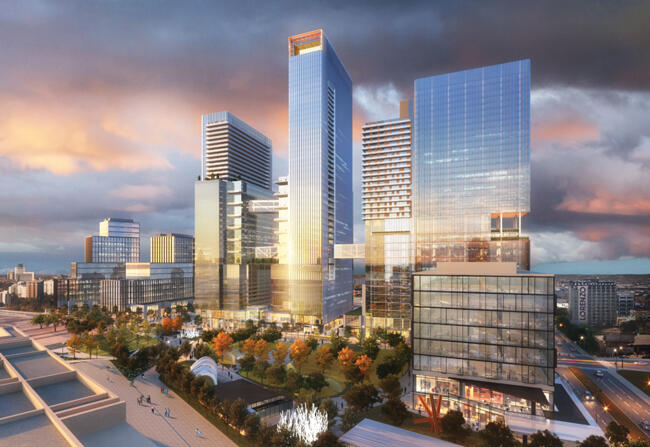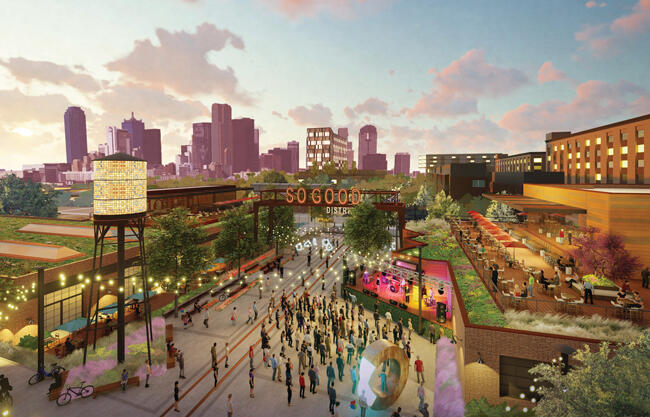Most developers who dare to take on megaprojects do them one at a time. Mike Hoque is not most developers.
Consider just the following projects the 49-year-old head of Hoque Global hopes to realize south of downtown Dallas: SoGood @ Cedars, a 15-acre complex with apartments and a brewery; the Newpark district, which in just its first $380 million phase will include a 38-story tower, 225,000 square feet of office space, a hotel and nearly 300 residential units; and University Hills, a 270-acre urban village near the University of North Texas with hundreds of homes, plus commercial buildings and a town center.
The Bangladeshi-born serial entrepreneur previously started a series of successful businesses and restaurants. In 2015, Hoque bought and renovated the 27-story Adolphus Tower, which he now describes as “the only boutique office building in downtown.”
But that’s hardly the kind of track record you see for someone looking to reshape a city. Hoque is now poised to take a significant jump into developing millions of square feet. He’s also heading up the Evans & Rosedale District in southside Fort Worth and a Hill Country project called the Vineyard at Florence, a $500 million “residential winery” with 1,000 homes under development. Those are major, complex projects whose impact on the city have some in the business questioning whether Hoque is the right person to bring them to life.
“He’s got a slick presentation,” said Monte Anderson, a longtime Dallas developer who runs Options Real Estate.
“It’s just coming out of nowhere. I see these resumes and fancy websites, but what has he actually done himself?”
Rik Adamski, principal of local planning and design firm Ash + Lime, said funding Hoque’s ambitious projects didn’t seem like a particularly constructive use of the city’s money, given the area’s lack of significant office demand.
Hoque would counter that what he may lack in experience, he makes up for in ambition, business acumen and the humblebrag philosophy of never being the smartest person in the room. He’s savvy enough to bring on skilled partners. Newpark, for instance, will be done with corporate developers — Dallas-based KDC and Aimbridge Hospitality, as well as Omaha-based Lanoha — with Hoque focused on what he knows best, restaurant and retail.
“We never try to do everything by ourselves,” Hoque said during a video interview from his office in Comerica Tower, dozens of stories above one of his former prize restaurants, Dallas Chop House, which closed earlier this year. He then played a promotional video of Newpark, later pointing out, with a wry smile, that he never spoke on screen once. Genial and compact, with a shaved head and wearing a casual dress shirt, Hoque seems to lean slightly forward, signaling energy under the surface. Steve Van Amburgh, CEO of KDC and a partner with Hoque, said he was a hands-on manager, both patient and urgent all the time; collaborators should be prepared for both early morning and late night calls

Newpark
Hoque’s audacious bet to head up multiple megadevelopments simultaneously and remake a good portion of South Dallas have been years in the making and represent a belief that adding significant downtown office and retail space can work even as urban commercial property is going through a big post-pandemic reckoning.
That vision also relies on help from friends in high places, including Governor Greg Abbott, who approved Opportunity Zone designations for a good portion of Hoque’s portfolio, and the Dallas City Council, which offered up to $96.1 million in incentives for Newpark and up to $31.4 million for University Hills. Hoque also has the backing of a silent partner.
“Getting out of jail”
Hoque has shown himself to be a shrewd, strategic operator, able to work with local officials and pull the available levers of public support.
The story typically told about him reads like an embodiment of the American entrepreneurial dream.
Hoque arrived in Dallas from Dhaka, Bangladesh, at age 15, a military academy graduate sent to visit an uncle on a trip he described as “getting out of jail.” He used the discipline drilled into him at school to enter and succeed in an array of businesses (he still wakes up at 4 a.m.). When he informed his father he wasn’t coming home, he was cut off.
After spending a few years in New York City, Hoque returned to Dallas in 1999 energized. He co-founded a chauffeur business, starting with a single Town Car (during one tour for Boeing execs on a corporate HQ search, he overheard them complain there was nothing for their employees to do downtown, which got him thinking about retail and hospitality real estate). Armed with $300,000 he was saving for his daughter’s inheritance, Hoque started in the restaurant game in 2005, opening Go Fish Ocean Club. The restaurant, where he “tried to do everything himself,” shuttered in 2010, but Hoque was off to the races. Over the next few years, he started such spots as Dallas Fish Market and Wild Salsa, operating them under Dallas Restaurant Group and claiming he was being called the “Danny Meyer of Dallas.”
He also refined his way of doing business, characterized by working with family and bringing on strong operating partners while he focuses on creativity (“once I create a concept, I’m pretty much thinking about the next thing,” he said). The head of his restaurant group, Nafees Alam, was pushed to get an MBA, then at his graduation, was given a box of business cards, which identified him as CEO.
Around 2010, Hoque began an assemblage on the south side of downtown Dallas, methodically buying up parcels from nearly 100 owners to put together 35 acres: a 15-acre site South of I30 between Good-Latimer Expressway and Cesar Chavez Boulevard that will be SoGood, and a 20-acre assemblage, the future site of Newpark, which sits between the convention center and Farmers Market.
At the time, it was a dead zone, with little commercial activity and barely a place to get a cup of coffee. Hoque said that so many other developers kept heading further north, “all the way to Oklahoma,” and that he didn’t want to be the developer who just bought a small track, flipped it and turned to the next project.

SoGood @ Cedars
The Adolphus exemplified this philosophy. Hoque doesn’t like debt, doesn’t raise a lot of money from outside and, instead of being a “deal junkie,” only makes acquisitions “that we know we have the medicine for.” In the case of the assemblage, he said he wanted to do something significant for the south side, focused on education and technology. He soon reached out to the business improvement district, Downtown Dallas Inc., said Evan Sheets, the group’s vice president of development, to start talking about planning.
“I didn’t tell the sellers of the land what my plan was,” Hoque said. “I was just buying as much land as I could buy to do a significant development. You won’t change that area, you won’t change people’s minds, without doing something big.”
Hoque’s thesis of mixed-use development being a transformative force solidified during this time.
“His first four or five concepts along Main Street and downtown were really the first in the area, and he took a big risk putting them there,” said Sheets. “He saw an emerging residential population interested in a more urban lifestyle. He was instrumental in a kind of proof of concept.”
Wake-up call
Hoque tried to use the Newpark parcel, previously called the Dallas Smart District, as a lure to win Amazon’s HQ2. After a year of courtship, he failed, but the experience convinced him of Dallas’ potential as a tech hub. He also altered his tactics, as he put it, and “woke up.”
“When I say I woke up, you know, it was a punch in the gut, like we got left at the altar,” he said, referring to the failed Amazon deal. “I had to wake up for my city. Dallas has two international airports, good education, but I don’t think it’s marketing itself very well. So I had to wake up and think about how we reshape our city.”
Hoque also became more aggressive about courting city and state government. Without the $98 million in tax-increment financing, a tool that diverts future property tax income to economic redevelopment, Newpark “wouldn’t pencil out,” he said. His proposal for University Hills better matched the sort of laboratory model the city wanted compared to the plan put forward by the previous property owner, Centurion American. Hoque hired a firm to lobby Abbott for the Opportunity Zone designations. Created by the 2017 tax law, these areas provided capital gains benefits for long-term economic development in a bid to steer economic activity to underdeveloped neighborhoods. Hoque scored a coup by including land he owned. D Magazine said these areas happened to be “where real estate developers had already acquired land and the fundamental economics were in place.” A Dallas Federal Reserve specialist cited in the magazine article, who studied the state’s OZ designations, concluded that they would merely accelerate change in already gentrifying areas.
Sheets, from the downtown business district, argues that the city isn’t as exposed to risk as one might think. There are performance-based incentives in the TIF agreement, which doesn’t take money from school funding, and Hoque’s creative vision includes many other experienced developers.
It also includes, crucially, the support of a wealthy partner, Kris Davis, the daughter of oil billionaire Ray C. Davis. In previous interviews, Hoque referenced an unnamed female benefactor who wished to remain nameless. The Real Deal‘s examination of business records for Hoque’s real estate and restaurant projects uncovered Kris Davis, an owner of Vineyard at Florence, who brought Hoque onboard that particular project in 2018. When contacted by TRD, Davis said they met a decade ago, and joined together to establish an ESG fund, FAQ Capital, to invest in projects that can have “meaningful impact on communities.” The fund functions as an investment vehicle for multiple Hoque projects. Hoque takes the lead on developments, Davis said, and they work together to set investment strategy.
“We met for lunch weekly for two years before we ever invested a dollar,” said Davis. “Mike and I both believe in taking the time to get the vision for projects right and have the patience for responding to market movements.”
Hoque’s attempt at creating a new neighborhood in South Dallas isn’t the first effort to revitalize that region, but it may be the first coming at a time when the fate of big, centralized neighborhoods centered on commercial real estate, the pre-pandemic megadevelopment model, is facing a reckoning in a distributed-work world. After years of talking about his plans and the potential to lure companies downtown, Hoque still lacks a big-name tenant. Dallas office real estate has been slow to get out of a slump; the 4.2 million square feet of leasing last quarter was still 19 percent below pre-pandemic averages. After break-even absorption in the first quarter, office absorption was negative in the second quarter, according to Avison Young, with a glut of sublease space identified as a big culprit. JLL specifically called out the big increase in subleasing in the central business district.
But these challenges haven’t deterred Hoque. His projects have clicked with the city’s larger vision of urban development, and he’s aiming to break ground on Newpark in the second quarter of next year, sure the location is the latest in a series of intrepid bets that will pay off.
“You create opportunity by creating this kind of big, bold movement,” he said. “You could have the headquarters of Google, Facebook and Twitter here. Projects like this will open other people’s eyes.”
